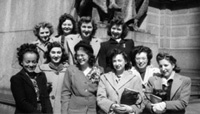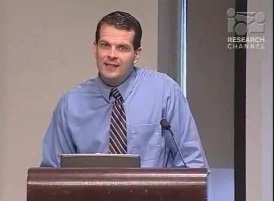February 10, 2008
#publications
UPDATE: The Internet and American Business is now out in paperback
Winner of the 2008 Choice Magazine award for outstanding academic title.
<img class=”left border src=”/nensmeng/images/internet-business-sm.jpg)”>
It’s finally here! The Internet and American Business has arrived via MIT Press. From the jacket blub: “Tracing the impact of the commercialized Internet since 1995 on American business and society, the book describes new business models, new companies and adjustments by established companies, the rise of e-commerce, and community building; it considers dot-com busts and difficulties encountered by traditional industries; and it discusses such newly created problems as copyright violations associated with music file-sharing and the proliferation of Internet pornography.”
My contribution is called Resistance is Futile? Reluctant and Selective Users of the Internet It explains why a series of industries – including healthcare and higher education – have not yet been radically transformed by the Internet.
January 30, 2008
#research
Just got back from the SOFT-EU Workshop in Grenoble. The workshop was part of a larger project called History of Computing - Software for Europe, which is in turn part of the larger Tensions of Europe: Technology and the Making of Europe project. I spoke on the software crisis and its relationship to professional development in software.
November 10, 2007
#publications
Nathan Ensmenger, “Computers as Ethical Objects,” IEEE Annals of the History of Computing 29:3 (2007), 86-88.
Download the pdf.
July 16, 2007
#media

I just finished filming a segment for a documentary by local film-maker LeAnn Erikson. I was just one of the talking-head historians. The real heroes of the film are the women who worked as mathematicians and “human computers” during the Second World War (including those who programmed the ENIAC computer right here at the Moore School of Electrical Engineering).
View the trailer online.
July 16, 2007
#media
Case Files in the History of Computing

This is the second in a series of symposium hosted by the Franklin Institute and the History & Sociology of Science department celebrating the opening of a new section of the electronic case files archives.
The focus of the presentation was on the early history of the computing industry, featuring key individuals including Hollerith, Burroughs, Eckert, Mauchly, Bardeen, Brittain, and Shannon. Professor Ensmenger provided a general overview of the history of computing.
The full video can be is running on the Research Channel.
May 10, 2007
#publications
Nathan Ensmenger, “Resistance is Futile? Reluctant and Selective Users of the Internet” in P. Ceruzzi and W. Aspray, The Commercialization of the Internet and Its Impact on
American Business (MIT Press, forthcoming)
Download the pdf of the draft version of this paper.
May 10, 2007
#media

On February 20th, 2007, Dr. Ensmenger will be giving a talk at the University of Wisconsin entitled “Neither Luddites nor Sages: Physicians and Professors as Reluctant Users of the Internet.”
The seminar is funded by the UW-Madison Holtz Center for Science and Technology Studies, and sponsored by the UW-Madison School of Library and Information Studies.
See the
full poster.
December 13, 2006
#media

This paper was based on some research that I am currently developing on the history of decision technologies.
From the paper:
“It is also clear that no-one quite knows what to do with software;
computer science focuses on software as algorithm; history of
computer science is often told as old-style intellectual history;
this is obviously insufficient, software sits uncomfortably between
science technology; not a thing, an yet clearly constructed;
invisible, ethereal, often ephemeral; also not clear what exactly
constitutes software; programs, practices, people; software is
perhaps the ultimate heterogenous system…
“And so his paper represents an attempt to think seriously about
software as a material artifact, as a technology embedded in systems
of practice, networks of exchange…”
August 09, 2006
#media
The History of Communications in America

The Franklin Institute offers an electronic presentation of its Case Files, a collection of primary source documents that exists as an unknown repository of the history of science and technology. The University of Pennsylvania’s Department of History and Sociology of Science hosted a Symposium to discuss the historical, scientific, and educational merit of the Case Files, which date from the 1820s, as a modern day resource for undergraduate, graduate, and professional scholars, as well as K-12 students.
Research Channel
May 10, 2005
#media
As rapidly as computer technology has changed, so have our hopes for – and fears about – its potential. How do we imagine the place of computers in our lives?
Historians of science and technology Nathan Ensmenger and Paul Edwards join Chicago Public Radio’s Gretchen Helfrich for the discussion. Ensmenger writes and researches on the history of software, artificial intelligence, and the information age. Edwards is author of The World in a Machine: Computer Models, Data Networks, and Global Atmospheric Politics.
Listen online





